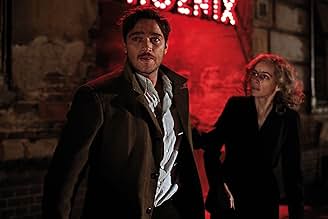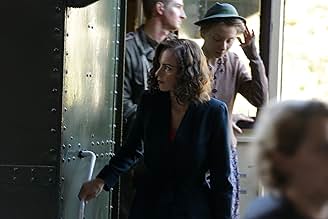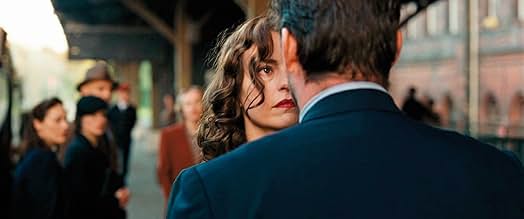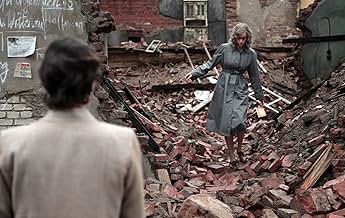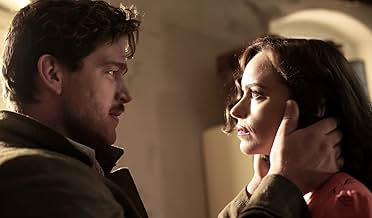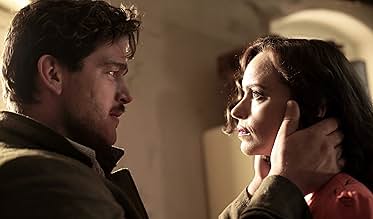Una sopravvissuta sfigurata all'Olocausto si propone di determinare se l'uomo che amava ha tradito la sua fiducia.Una sopravvissuta sfigurata all'Olocausto si propone di determinare se l'uomo che amava ha tradito la sua fiducia.Una sopravvissuta sfigurata all'Olocausto si propone di determinare se l'uomo che amava ha tradito la sua fiducia.
- Regia
- Sceneggiatura
- Star
- Premi
- 17 vittorie e 30 candidature totali
- Tänzerin
- (as Valerie Koch)
Recensioni in evidenza
Nina Hoss, Ronald Zehrfeld, and Nina Kunzendorf star in "Phoenix," a 2014 film based on the French novel "Return from the Ashes".
There was a previous film made from this novel, actually called Return from the Ashes in 1965. I remembered seeing that movie as a kid and finally found it again. It's very good, but this film is better.
Nina Hoss plays Nelly, a concentration camp survivor who was shot in the face. A government worker, Lena (Kunzendorf) in charge of helping victims, brings her to a plastic surgeon.
Nelly is adamant that she wants to look exactly as she did before. The doctor can only promise to try. When she asks Lena who is paying for all this, Lena tells her that her entire family is dead and she has come into quite a bit of money.
When Nelly sees herself, the face is foreign to her and she says, "I don't exist." She stays in an apartment with Lena. Lena has found an apartment for her in Palestine, where Lena is also moving.
Nelly wants to find her husband Johnny (Zehrfeld), a non-Jew, but Lena cautions her that he betrayed her to the Nazis. She was a singer and he a pianist, so she goes to various clubs, but finally finds him working in a club called Phoenix as a dishwasher.
Johnny doesn't recognize her, but he asks her if she wants some work. He explains to her that he can't get his hands on his wife's money. He wants her to impersonate Nelly, show up alive, claim her inheritance, and in return, he will pay her.
At first, Nelly refuses, then relents. He shows her a photo of Hedy Lamar and says his wife modeled herself on that.
Nelly returns to Lena and tells her that she's going to do the impersonation and not go to Palestine. She will stay with Johnny. She knows he would never have betrayed her.
Director Christian Pezold has woven noirish tapestry about survival, love, betrayal, and guilt. It is reminiscent of Vertigo but with the specter of the Holocaust, much deeper and intense.
Nina Hoss is beyond perfection as Nelly, desperate for her old life, her old face, her husband, to wipe out all she has suffered. Like Zehrfeld, she says more with her expressions than with dialogue. Zehrfeld as Johnny presents a disturbing puzzle of denial and horrific guilt, so unbearable that he tries to recreate Nelly.
The last scene in this film, in its simplicity, is stunning and powerful.
A brilliant film, which you may want to view more than once to pick up details along the way.
Lisbon & Estoril Film Festival #6
Phoenix has been one film that has been going through the fall film festival circuit (it premiered at Toronto and it has been all over the place around Europe), and even though it has gotten fantastic reviews and it was directed by already established director Christian Petzold, the film has received much attention. So I was thrilled when I saw that this film was in the line-up for the festival, I knew little or nothing about it, I hadn't seen any trailers and it seemed as though this one could be the festival's revelation. Still I went in just hoping to find a decent picture.
Phoenix is Directed by Christian Petzold and it stars Nina Hoss, Ronald Zehrfeld, Nina Kunzendorf, Uwe Preuss, Michael Maertens and Valerie Koch.
The war has ended and the survivors are returning home. Are they really lucky that they survived? A woman comes back home, to Berlin, with a disfigured face and a shattered mind. Nelly is going to have her face reconstructed, the doctors ask her what face she wants, maybe of a film start, but Nelly just wants her face back. Nelly just wanted everything to be as it was before the war, she wants her life, her husband, she wants to sing in the coir again, she wants to be able to live one more time. She searches for what's lost, her husband Johnny. Johnny who might have betrayed Nelly and sent her to a concentration camp. She ultimately finds Johnny alive, working at a cabaret in Berlin. He doesn't recognize her and her heart is broken. But he sees that her new face is similar to his wife's face and he tells the stranger (Nelly, is own wife) that they could both get a lot of money by pretending that she was his wife. Nelly's healing face and broken spirit accept the challenge of impersonating herself, or at least what she once were. Johnny gives her lessons and through these lessons Nelly hopes to become what she wants was, through these lessons she hopes to win his husband back.
Only a few weeks ago Fury was released, a tired, familiar World War II picture with very little to say. An America *beep* Yeah kind of picture with a lot of violence, where the Germans have the depth of the Nazis in Dead Snow and where every single character in that tank was a mere cliché. If you are going to make a World War II picture at least have some respect for your own subject. The fact that this one was a World War II picture made me a little scared, this sub-genre is way too iterant as it seems as though they make these pictures for the explosions. Really? Should you turn such an important subject into a Michael Bay depthless picture? This one though, fortunately, it is not Fury. It pays respect to its subject and it actually has something to say.
Looking back Phoenix is actually an incredibly simple film, that doesn't even take many risks when it comes to narrative. It is simple but undeniably effective. The film is built up quite slowly and to say the truth it never takes many risky, unpredictable paths as what happens is pretty much expected. Still I found the picture to be incredibly compelling on an emotional level. Much of that is due to the fantastic acting by both Nina Hoss and Ronald Zehrfeld and because of Christian Petzold approach. An approach that might seem reserved, cold, too simple to some but I found it to be rich and absorbing. The film is like a big countdown, a crescendo, to a huge emotional climax that's simple and expected and still it struck me quite hard.
Nina Hoss continues to be the target of Christian Petzold's attention and she continues to show why she's worthy of his attention and of the attention of many others. She has already been this year in Anton Corbijn's fantastic A Most Wanted Man delivering a strong performance. I really hope to see more from her in the future because she's got some talent. She carries this picture, she doesn't only give the face to the character, she becomes the character, she shine.
I can see many being upset with the fact that the film doesn't make many bold moves and it ultimately takes the path that you expected it to take. Still it is beautifully constructed and crafted, the acting is excellent (especially from Nina Hoss, who was supposed to be present but didn't make it), it's emotionally complex and rich and it ultimately delivers the goods with a strong climax that will likely wreck you.
Rating:B
If this brings to mind the idea of Nicolas Cage and John Travolta swapping faces in the awesomely bad "Face/Off", then you're not far off the mark. But listen up, here's why it works perfectly.
The theme of "Phoenix" involves how people face an unacceptable past. There are 3 main characters who each personify a particular, extreme response. It has to be extreme, it has to be preposterous, and most importantly we have to accept it. Either that or just walk out of the theater after 5 minutes and watch Monday night football instead. Our 3 characers are: 1) Nelly - she cannot let go of her traumatic past, and at the same time she has no past because she has no identity, figuratively and literally. 2) The husband "Johnny" - he utterly rejects the past, for reasons you'll figure out soon enough, and so he refuses to recognize his wife. In fact, we get the feeling that even if she were the spitting image of herself, he would still refuse truth. Such is the nature of psychological denial. And 3) We have Nelly's only friend "Lena" who has become a tireless political activist, saving survivors and trying to keep the past "alive" even though she is confronted with a society that has already moved on.
So you see how this story isn't supposed to be taken as a literal drama but rather as a very creative metaphor to illustrate how psychology works in 3 vastly different personality types. Further driving the surreal nature home, we have gorgeously shot, vividly composed visuals. If you ever wondered how Film Noir would look in color, then look no further. There have been a few contemporary classics which sought to bring Film Noir into the modern age, such as 2005's "Sin City" with its introduction of red to the crisp b&w palette, or before that was 1994's "The Crow" with its use of extreme darkness and "dead" colors. Here in 2014's is the next decade's evolution. In this case there is bold use of colors, but they are distinctly and "impossibly" presented: a dark alley is illuminated with a ghostly red light even though there are no red light sources to be seen, or a dark scene of bombed out ruins has unrealistic islands of light illuminating patches of rubble, all in vivid color but with stark contrast against the black spaces. The cinematography and lighting is as purposely unrealistic as the plot.
Ultimately if you grasp all of this, or if you just decide to go along with it for the sake of seeing how everything turns out, your suspension of disbelief will be amply rewarded. As nearly every other reviewer has noted, the ending is fantastic. Beyond fantastic, it's the whole point of the movie. In an interview, director Christian Petzold says the entire story comes down to the last 3 minutes, and that's where it will either come together or utterly fall apart. For my money, it's a total winner. "Phoenix" definitely does NOT crash & burn.
Even if you're a disfigured Holocaust survivor like Nelly (Nina Hoss), tomorrow's march of time will bring its own survival scenario. Her new face gives her problems with her husband, Johnny (Ronald Zehrfeld), as he recruits her to impersonate his wife in order to get his wife's inheritance. As in Hitchcock's Vertigo, the lead female undergoes transformation dealing with the man in her life while sustaining the mistaken identity motif.
Even that plot feels Hitchcockean. No question it's a classic suspend-your-disbelief situation, and it has the almost dreamy quality of Boy in the Striped Pajama. Both works take an isolated, unbelievable scenario related to the Holocaust that nevertheless illuminates the numbing, existential anguish of that horror.
While Nelly searches for Johnny, she is also discovering strength in herself that is part survival and part recognition that the corruption of Auschwitz is not the only corruption in the world. The depiction of that dark postwar world has German expressionism written all over it with the black and white contrasts, lonely European streets and even the corruption and irony of the cabaret.
Nina Hoss's performance, part stunned and part determined, deserves award-season recognition. Her uncertain gait and disfigured face suggest the disorientation the war has brought.
Director Christian Petzold deserves credit for the stunning noirish look that also reflects a real-world, anytime struggle humans have with the combat between appearance and reality and the realization that we cannot know each other completely. As the title suggests and the name of the night club reflects, regeneration is possible but may be as elusive as the mythical bird.
"No movie has ever been able to provide a catharsis for the Holocaust, and I suspect none will ever be able to provide one for 9/11. Such subjects overwhelm art." Roger Ebert
The film follows Nelly, played by Nina Hoss, a Jewish concentration camp survivor and former nightclub singer who's suffered severe disfigurement. She undergoes facial reconstruction, nearly looking like her old self, and tries to find peace with her lost previous identity. She heads to post-war Berlin to locate her estranged husband and partner in their former activism, played by Ronald Zehrfeld, but upon doing so he recruits her to help him on a scam to claim his wife's inheritance. As she looks almost alike, he moulds her to act like his wife did and have her 'return' and scoop up the money.
There's another liberty you have to buy in order to go along with Phoenix. That being, despite all the hints, at no point does her husband Johnny recognize Nelly until the inevitable moment. This redressing of a former lover plot line is quite reminiscent of Hitchcock's Vertigo, but with Johnny's indifference and greed it's a different spin, and we observe Nelly's submissive re- judgment of him. It thrives on the dramatic irony of when Johnny thinks that she isn't acting enough like his wife. It's fascinating to watch her rediscover herself, and a delight when she impresses him with how accurate she can be at times. All these minor contrivances work thematically to build a picture of a search for identity and heartbreaking betrayal. It's a refreshing perspective on a revision of a past life and then healing from it.
Christian Petzold and Nina Hoss' collaborations have been steadily building momentum as Phoenix, their 4th film together, gains buzz on the festival circuit. Clearly it is a beneficial partnership. Through her glassy eyed look nearly in tears and her anxious movements, Hoss faultlessly marries fragility with a burning motivation to disquiet her soul. She may be easily manipulated due to her weakened psychological and physical state, but she always has intentions that she's slowly building up to. Before taking board with her husband, she's assisted by Lene, played by Nina Kunzendorf, a fellow Jewish activist. Her performance is steely and enigmatic, and I can't help but want to know more about her and her motivations so it's a shame the film doesn't quite deliver in that regard.
Often times the film holds back on payoff, although it's often executed in thoughtful manners. Most strikingly is in the film's conclusion. In a way, it almost feels as though it's missing an entire third act. Perhaps the director felt it did not need an epilogue, but I was left hungry to explore the consequences. Hoss does admit that they didn't know how to end it. However, it is a remarkable display of restraint to leave it as open as it did and frankly it works with the slight nature of the film beforehand. But on the other hand it feels like Petzold simply ran out of ideas and is idly leaving the viewer to fill in the rest. The film constantly feels like it's building to something, and the ending changes everything in hindsight, but perhaps it works in the film's favour, to draw a comparison to The Sopranos' infamous final moment as it leaves you cold.
Despite the film's small scale, with most of it taking place in Johnny's small apartment, it does show off lush production design. Postwar rubble has never felt quite a mess like this since Saving Private Ryan. The film does try to take on a grander scale, implying that the formation of Israel is like Nelly and reborn from the ashes, but it works best when it's focused on the core relationship. The saturated but vivid cinematography contributes to its beguiling pulp tone and it holds a lot of tension in the air, complimenting the weight of the performances. It's a fascinating concept and well-executed script, and my only reservations with Phoenix come with its choice of the resolutions for its various plot threads. But these are up for debate, and they're ones worth engaging in for such an otherwise stellar and quietly affecting film.
8/10
Read more @ The Awards Circuit (http://www.awardscircuit.com/)
Lo sapevi?
- QuizThe woman on the magazine cover that Nelly liked to emulate was Hedy Lamarr.
- BlooperThe actor playing the US Army Sergeant sentry at the checkpoint is clearly German: while he speaks English well, his German accent still comes through.
- Citazioni
[first lines]
Lene Winter: [arriving at the border]
Soldat an der Brücke: Passport... Nice car. Where did you get it from?
Lene Winter: It's from Switzerland.
Soldat an der Brücke: Just like you?
Lene Winter: Like me.
Soldat an der Brücke: [whistles to the gate] They're from Switzerland. The girl too.
[to her passenger]
Soldat an der Brücke: I want to see your face.
Lene Winter: Can I talk to you?
[gets out]
Lene Winter: Come on, she's not Eva Braun.
Soldat an der Brücke: Of course not. The bitch got killed by her husband.
Lene Winter: She's from the camps.
- Colonne sonoreSpeak Low
Music by Kurt Weill
Lyrics by Ogden Nash
Performed by Nina Hoss and heard as a theme over the credits
I più visti
- How long is Phoenix?Powered by Alexa
Dettagli
- Data di uscita
- Paesi di origine
- Siti ufficiali
- Lingue
- Celebre anche come
- Phoenix
- Luoghi delle riprese
- Legnica, Dolnoslaskie, Polonia(Berlin in 1945)
- Aziende produttrici
- Vedi altri crediti dell’azienda su IMDbPro
Botteghino
- Lordo Stati Uniti e Canada
- 3.184.472 USD
- Fine settimana di apertura Stati Uniti e Canada
- 30.296 USD
- 26 lug 2015
- Lordo in tutto il mondo
- 5.855.623 USD
- Tempo di esecuzione1 ora 38 minuti
- Colore
- Mix di suoni
- Proporzioni
- 2.39 : 1
Contribuisci a questa pagina



